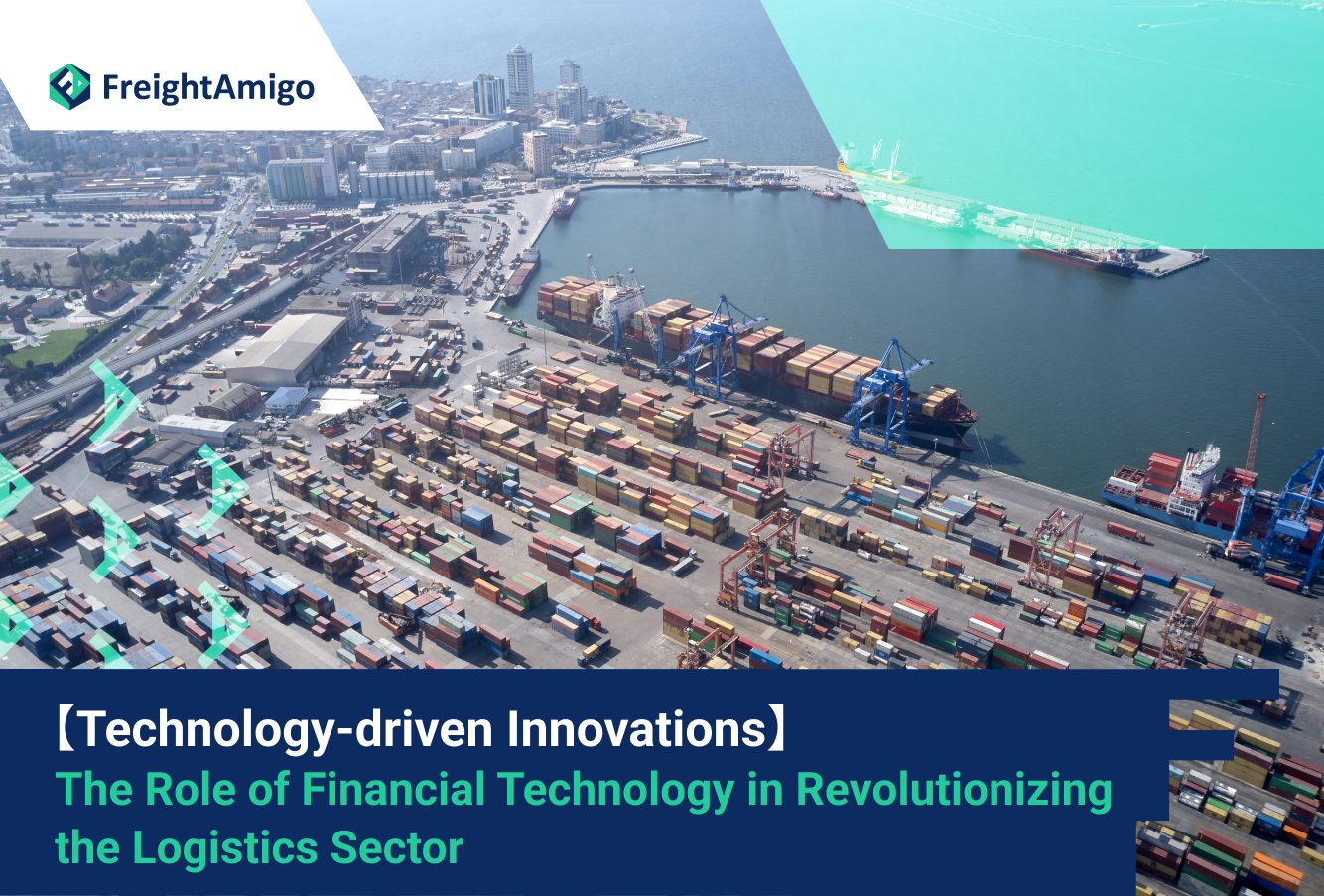Author Name: Tiffany Lee – Marketing Analyst at FreightAmigo
In today’s fast-paced and highly competitive business landscape, the logistics sector is constantly seeking innovative solutions to streamline operations, reduce costs, and enhance customer experiences. One technology that has emerged as a game-changer in the logistics industry is financial technology, or fintech. Fintech, combined with data analytics, has the power to transform traditional logistics processes and drive efficiency, transparency, and profitability.
Want To Compare The Best Express, Air Freight, Sea Freight, Rail Freight & Trucking Rates So As To Have Better Control On Cost?
Understanding Financial Technology in Logistics
Financial technology refers to the use of advanced digital tools and technologies to deliver financial services, including payment processing, risk management, and financial analytics. In the logistics sector, fintech solutions are revolutionizing traditional financial processes, such as invoicing, payment collection, and supply chain financing. By leveraging fintech, logistics companies can automate and streamline financial operations, reducing paperwork, eliminating manual errors, and improving cash flow management.
The Impact of Data Analytics in Logistics
Data analytics plays a crucial role in unlocking the true potential of financial technology in the logistics sector. By harnessing the power of data, logistics companies can gain valuable insights into their operations, customer behavior, and market trends. These insights enable informed decision-making, identify areas for optimization, and drive operational efficiency. Data analytics also helps logistics companies forecast demand, optimize inventory levels, and make data-driven financial decisions.
Leveraging Data Analytics for Financial Decision-Making
One of the key areas where data analytics is transforming financial decision-making in logistics is in demand forecasting. By analyzing historical sales data, customer behavior patterns, and market trends, logistics companies can accurately predict future demand. This enables them to optimize inventory levels, reduce stockouts, and minimize carrying costs. Data analytics also helps logistics companies optimize pricing strategies, identify cost-saving opportunities, and improve overall financial performance.
Enhancing Cash Flow Management
Cash flow management is critical for logistics companies, as it directly impacts their ability to meet financial obligations, pay suppliers, and invest in growth opportunities. Data analytics tools provide real-time insights into cash flow, enabling logistics companies to monitor and manage their financial resources effectively. By analyzing cash flow patterns, logistics companies can identify potential bottlenecks, optimize payment schedules, and improve working capital management.
Streamlining Invoicing and Payment Processes
Traditional invoicing and payment processes in the logistics sector can be time-consuming, error-prone, and resource-intensive. However, with fintech solutions powered by data analytics, logistics companies can automate and streamline these processes. Automated invoicing systems generate accurate invoices based on real-time data, reducing the risk of errors and improving billing accuracy. Additionally, digital payment platforms enable secure and efficient payment collection, reducing the time and costs associated with manual payment processing.
Improving Risk Management
Risk management is a critical aspect of financial decision-making in the logistics sector. By leveraging data analytics, logistics companies can identify and mitigate potential risks, such as fluctuations in fuel prices, disruptions in the supply chain, or changes in customer demand. Advanced analytics tools enable logistics companies to analyze historical data, identify risk patterns, and develop predictive models to anticipate and proactively manage risks. This improves overall financial stability and resilience in the face of uncertainties.
The Future of Financial Technology in Logistics
As technology continues to advance, the role of financial technology in the logistics sector is set to grow exponentially. Here are some key trends that are shaping the future of fintech in logistics:
Blockchain Technology for Enhanced Security and Transparency
Blockchain technology holds immense potential for improving security and transparency in financial transactions within the logistics sector. By leveraging blockchain, logistics companies can create secure, tamper-proof digital ledgers that record every financial transaction in real-time. This ensures transparency, reduces the risk of fraud, and enhances trust among stakeholders. Additionally, blockchain technology enables seamless cross-border transactions, eliminating the need for intermediaries and reducing costs.
Artificial Intelligence and Machine Learning for Advanced Analytics
Artificial intelligence (AI) and machine learning (ML) are revolutionizing data analytics in the logistics sector. By leveraging AI and ML algorithms, logistics companies can analyze vast amounts of data in real-time, identify patterns, and make accurate predictions. AI-powered analytics tools can optimize pricing strategies, automate financial decision-making processes, and provide personalized financial insights to customers. This enables logistics companies to stay ahead of the competition, improve customer experiences, and drive revenue growth.
Robotic Process Automation for Efficient Financial Operations
Robotic process automation (RPA) is another technology that is transforming financial operations in the logistics sector. RPA enables logistics companies to automate repetitive and rule-based financial tasks, such as invoice processing, payment reconciliation, and financial reporting. By automating these processes, logistics companies can reduce errors, improve efficiency, and free up resources to focus on more strategic financial activities. RPA also ensures compliance with financial regulations and enhances data security.
Predictive Analytics for Real-time Financial Insights
Predictive analytics is becoming increasingly important in the logistics sector, enabling real-time financial insights and decision-making. By analyzing real-time data from various sources, including IoT devices, logistics companies can predict financial trends, identify potential risks, and make proactive financial decisions. Predictive analytics tools can provide real-time financial dashboards, automated alerts, and personalized financial recommendations, empowering logistics companies to optimize financial performance and respond quickly to market changes.
Conclusion
Financial technology, powered by data analytics, is revolutionizing the logistics sector. By leveraging advanced analytics tools, logistics companies can optimize financial decision-making, streamline operations, and improve customer experiences. The future of financial technology in logistics holds immense potential, with trends such as blockchain, AI, ML, RPA, and predictive analytics shaping the industry. As logistics companies embrace fintech solutions, they will be better positioned to compete in a rapidly evolving global marketplace, drive operational efficiency, and achieve sustainable growth.
There Are Different Options For Cargo Transportation. If You Want To Choose The Most Convenient And Suitable Solution, It Is Best To Have The Full Support Of Logistics Experts! If You Are Planning To Ship Goods Overseas, Please Go To The FreightAmigo Page For Inquiries.
===
Read More:
【Cosmetic Product Recycling】 A Guide to Sustainable Reverse Logistics
【Rise of Green Supply Chain】 Pioneering Sustainable Practices in Logistics
【ESG in Logistics】 How ESG Practices Drive Social Responsibility in Logistics
===
If you have any inquiries on logistics/supply chain, feel free to contact FreightAmigo now:
Chat with us online OR
Phone : +852 28121686
WhatsApp: +852 27467829









































